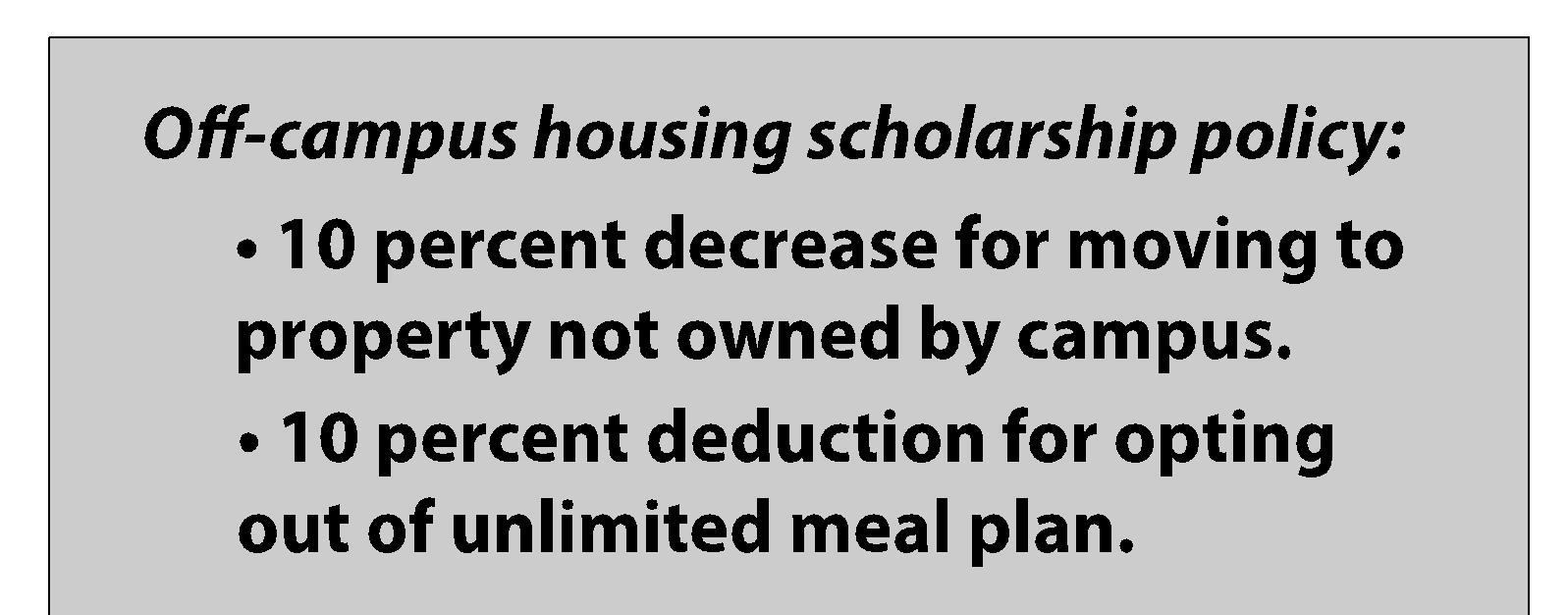Students upset by scholarship cutback policy
REBEKAH TUCHSCHERER
rjtuchscherer16@ole.augie.edu
After she graduated high school, Rachel Loon was a prospective student searching for the best balance of academics and financial aid she could find. After an offer of $10,000 in academic scholarships and an acceptance letter, Loon knew that Augustana was where she would embark on her undergraduate career.
But like many other students, Loon moved off campus and forgot to read the fine print.
Approximately 15 years ago, Augustana enacted a policy which cuts student financial aid scholarships by 10 percent if they chose to live on property not owned by the university. The policy deducts an additional 10 percent if students chose to opt out of the full meal plan.
Now living off campus, Loon collects only $8,000, or 80 percent of her initial scholarship offer.

With a growing student body, on-campus housing options for upperclassmen tightening and more students considering moving off campus, the policy may need to be revisited.
Dean of Students Jim Bies said that 80 percent of financial aid awards cover tuition expenses and the remaining 20 percent are set aside to cover mandatory room and board during freshman and sophomore years, in addition to any subsequent years students choose to spend on campus.
While the plan reduces academic and need-based scholarships, it leaves athletic, music, donor-funded and private scholarships untouched.
“It’s really considered a discount, and that’s what’s affected by this room and board policy,” Bies said. “The reason we have it is that if we have the capacity in our residence halls to offer you a room, and we have the capacity in our dining halls to have you participate in our dining program, then why should the college provide those things [off campus]?”

Loon said that Augustana needs to encourage upperclassmen to be more independent, which includes promoting off-campus housing when theme houses and on-campus dormitories are tight.
“You have to grow up at some point,” Loon said. “We’re 20, 21 years old—this is the time to do it. I think there are many benefits to moving [off campus] even if I do have to take out my trash and call my landlord if there’s a problem.”
Senior and off-campus resident Lucas Praeuner said he shares the same sentiments.
“It’s weird to me that they’re taking our academic scholarships for things that have nothing to do with academics,” Praeuner said. “We’re moving off campus and not using the meal plan, but that’s not affecting how we are academically. I’m just as good of a student as I was [living on campus].”
While Bies said students are initially told that 20 percent of financial aid is set aside to help cover room and board, both Loon and Praeuner were unaware of the 20 percent policy until finally moving off campus.
Corey Kopp, director of campus life, said the problem arises from unclear marketing.

“Part of it is a challenge in the way that it’s presented to students, and the way that it’s actually applied,” Kopp said. “It’s a process that’s talked about with you when you’re a prospective student as an incoming freshman. Then, it’s two or three years before you have to visit the concept again.”
Jonas Gjesdal, the chair of the Augustana dining and housing committee, aims to clear up confusion about the scholarship policy by initiating conversation between the administration and student body.
“The important thing is to figure out what students want,” Gjesdal said. “Do they want to stay on campus and have more rooms made available here, or are people more inclined to move off campus, keep their scholarship, or not have it reduced as much? We’re doing a good job voicing the opinion of the student body, and the administration is definitely listening.”
Kopp also noted that the administration may need to revisit the policy soon to address a rising campus population and fewer housing options for students, particularly upperclassmen.
In addition, Kopp and Bies said that conversations must begin about either renovating the second and third floors of Tuve Hall or building another apartment complex in the near future, as on-campus residences are up 69 students from the 2016-2017 academic year.
“We still aren’t entirely sure whether we’re in the middle of a trend, or the start of a trend, or if we’re finding ourselves in some weird anomalous blip that’s going to be a couple of years of great enrollments, and then settle back into a normal rhythm,” Kopp said.
Currently, Augustana has 1,345 beds available in residence halls, on-campus apartments, and theme houses with a total of 1,749 undergraduate students. According to Kopp, 71 percent live on campus, or approximately 1,242 students. The rest of the student body is composed of students choosing to live at home or off-campus.
Tom Meyer, vice president for finance, said though enrollment numbers have increased this year, Augustana is still 70 students below its capacity five years ago.
“If we built to capacity for every student that’s enrolled, we’d have a lot of empty rooms,” Meyer said. “I don’t know that it’s realistic to build to 100 percent capacity because some students will choose not to [live on campus]. We’ve been able to accommodate for all students who want to live in campus housing.”
Meyer also said that the financial aid scholarships and grants apply to a comprehensive college experience, rather than just the academic life.
“We view the scholarship as really providing for all three pieces,” Meyer said. “We view Augustana as a complete experience, and that’s one of the reasons we have this incentive as well. We want people to engage in community.”
Loon said that it’s difficult for students to get their housing preference accepted, especially as an upperclassman who no longer wants to live the traditional dorm life and receives a 20 percent scholarship decrease in return.
“No junior or senior really wants to live in that small dorm room and eat the unappetizing food, Loon said. “They want to try and grow and be more independent living on their own, [or] living with their friends, because it’s part of the college experience.”



